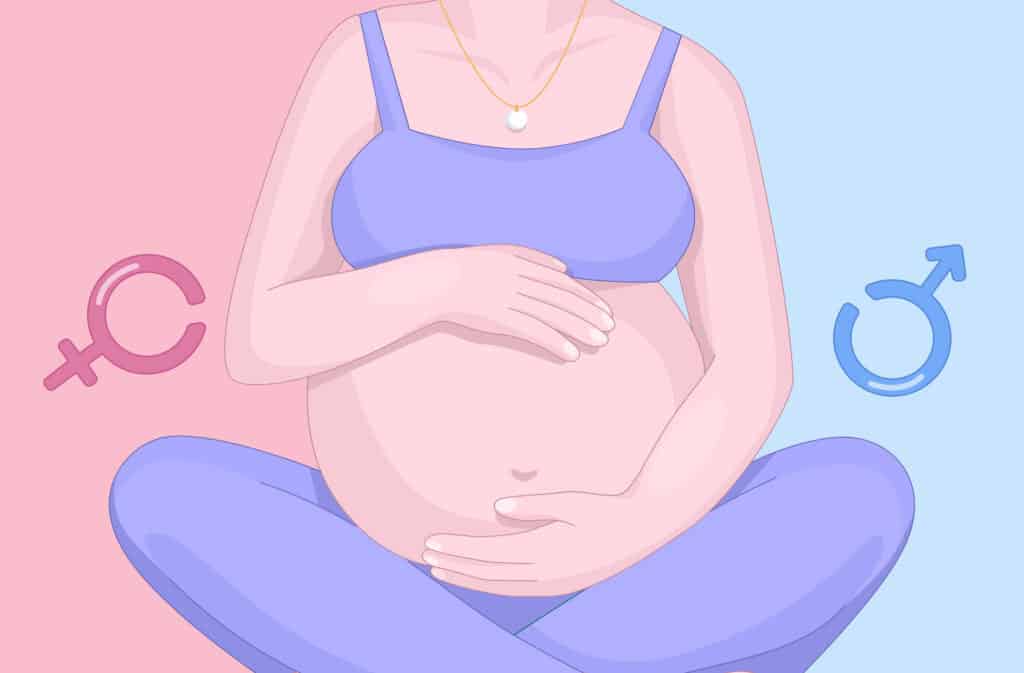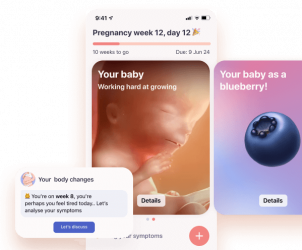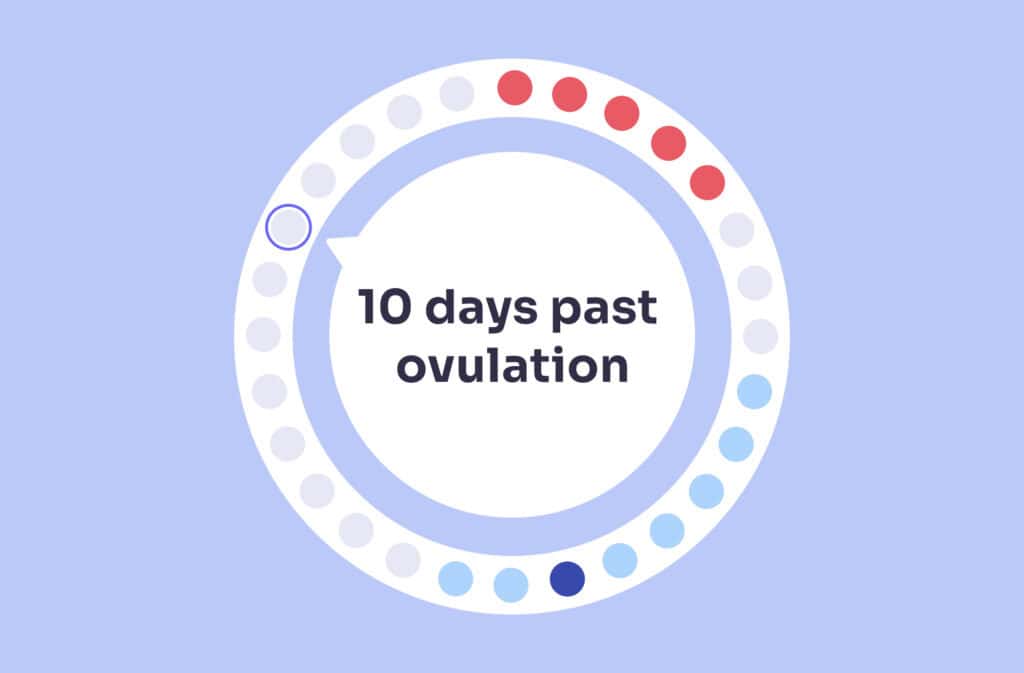Femia > Health Library > Pregnancy > Pregnancy health > Boy vs. girl pregnancy symptoms: myths vs. facts
Boy vs. girl pregnancy symptoms: myths vs. facts

- Updated Feb 27, 2025
- Published
CRAFTED BY HUMAN
Crafted by human At Femia, we provide accurate and up-to-date information at every stage of your journey, from trying to conceive, pregnancy and postnatal support. All content is created by a real person based on in-depth research and own professional experience. Femia ensures that you will receive expert advice, strict accuracy and a personalized approach from our authors/medical experts. Learn more about our editorial policy.
FACT CHECKED
Fact checked At Femia Health, we maintain the highest standards of editorial excellence in delivering content focused on helping you conceive, guiding you through pregnancy, and supporting you postpartum. Explore our content review principles to learn how we ensure the accuracy and quality of our health and lifestyle tips for every stage of your journey.
While some people say there’s a difference between boy and girl pregnancy symptoms, scientists have found otherwise. Though, of course, it can be fun to guess the sex of your baby, you shouldn’t place too much faith in old wives’ tales and superstitions.
Most of the myths about girl vs boy pregnancy symptoms originated at a time before accurate medical testing. Only a few generations ago, people had no way of knowing the sex of their baby before actually giving birth. Today, however, you can find out your baby’s sex by getting a blood test or having an ultrasound.
That said, it’s fun to explore the myths surrounding boy vs girl pregnancy symptoms. While there might not be any scientific proof backing most of them, they’re still interesting to know – just don’t take them too seriously.
When does your baby develop their biological sex?
Your baby’s sex is determined as soon as sperm meets egg. You may remember from high school biology that sperm carry either a male (Y) or female (X) chromosome. Eggs have an X chromosome. Depending on which sperm fertilizes the egg, you’ll have XX chromosomes (girl) or XY chromosomes (boy). Blood tests in early pregnancy can identify the sex of your baby by testing for Y chromosomes as early as six weeks into the pregnancy.
If you want to determine your baby’s sex by having an ultrasound, you’ll need to wait a little longer. Though sex is determined at the moment of conception, you need to wait for your baby’s sex organs to develop before they can be identified on an ultrasound. The internal sex organs look the same until around week nine. By week 11, the external sex organs begin to develop. Still, these aren’t accurately identifiable by ultrasound until around week 14, so most people wait until week 20 to find out the sex.
There are lots of different myths surrounding pregnancy symptoms and the sex of the baby, from the presence or absence of morning sickness, the pregnancy “glow,” to the shape of the belly’s bump.

Morning sickness: Boy or girl?
Myth: sickness during pregnancy means you’re having a girl
False, but there is a grain of truth
There is a widespread belief that girls make you throw up more. If you spend most of your pregnancy with your head in the toilet, people are more likely to tell you you’re having a girl. If you sail through your pregnancy with little nausea, they’ll say you’re carrying a boy. Track your symptoms with the pregnancy app to track pregnancy milestones and enjoy following your baby’s development, but remember that myths about symptoms predicting the baby’s sex are not scientifically supported.
Is morning sickness worse with a girl?
While changing hormone levels are known to be the true cause of pregnancy sickness, there does seem to be a link with gender. A 2021 study published in the Archives of Obstetrics & Gynecology found women carrying girls reported higher levels of nausea and vomiting.
When does morning sickness start with a boy?
Myth: women carrying girls may be more likely to suffer from nausea
False
Unfortunately, there’s no easy way of guessing the sex of your baby based on when morning sickness starts. People also mistakenly claim pregnancy nausea at night predicts the gender of your baby, but it doesn’t. While women carrying girls may be more likely to suffer from nausea and vomiting, that doesn’t mean these symptoms guarantee you’re carrying a girl. Plenty of boy mums spend their first trimester throwing up.
This myth plays on the age-old idea that girls are trouble and boys are easy. If you consider many of the myths surrounding pregnancy symptoms and gender, you’ll notice it’s common for the worst pregnancy symptoms to be attributed to girls.
👉Find out more: Is sperm good for the baby during pregnancy? Understanding its impact and safety
Appetite and cravings
Pregnant and always hungry: Boy or girl?
Myth: if you’re always hungry, it’s a boy
False, but there is some truth to it in that women carrying boys consume more calories
Many of the myths surrounding baby sex predictions feed into outdated views of gender. Many people think being hungry during pregnancy means you’re having a boy because it ties into the ideal of a “strapping young man” with a healthy appetite.
However, there’s some truth to the myth. If we dust off a 2003 study published in the British Medical Journal, women carrying boys ate 10% more calories than those carrying girls. The scientists thought it might be down to higher testosterone levels, though they didn’t investigate the cause.
It’s crucial to bear in mind however that everybody eats more during pregnancy. According to the American College of Obstetricians & Gynaecologists, you should eat an extra 450 calories daily during the third trimester. Your body needs the additional energy to support your baby’s development and growth.
No appetite first trimester: Gender link?
Myth: low appetitie means you’re having a girl
False
If lore has it that eating extra means it’s a boy, then it makes sense that people would assume a loss of appetite in pregnancy is due to gender. In actual fact, low appetite has nothing to do with the sex of your baby. Low appetite during the first trimester is likely due to hormonal changes. Nausea can also make you feel averse to eating a lot. Contact your healthcare provider for advice if you’re worried you’re not getting enough nutrients through your diet.
Food cravings when pregnant with a boy
Myth: salty food cravings mean you’re having a boy
False
People love to look for reasons, don’t they? If you’re craving salty or protein-dense foods, you’ve likely been told by friends and family you’re going to give birth to a boy. This myth may play into gender assumptions around protein and meat, and their association with strength and masculinity. However, a 2024 study published in the British Medical Journal analyzed the food cravings of 500 pregnant women and found no link between the type of food craved and the baby’s sex.
Food cravings when pregnant with a girl
Myth: salty food cravings mean you’re having a boy
False
People love to look for reasons, don’t they? If you’re craving salty or protein-dense foods, you’ve likely been told by friends and family you’re going to give birth to a boy. This myth may play into gender assumptions around protein and meat, and their association with strength and masculinity. However, a 2024 study published in the British Medical Journal analyzed the food cravings of 500 pregnant women and found no link between the type of food craved and the baby’s sex.
Bump shape
Myth: high bump means boy, lower and wider bumps for girls
False
People claim a high all-belly bump indicates you’re carrying a boy, whereas a lower and wider bump means it’s a girl. Nope, there’s no truth in this one. Your body type, weight gain, and baby’s position can influence bump shape; it has nothing to do with the sex of your baby.
It’s also pretty rude for people to comment on your body like that. If you’re getting tired of the constant body remarks every time you leave the house, a quick: “You shouldn’t comment on other people’s bodies” will likely shut them up. Don’t be afraid to speak up for yourself; your body isn’t fair game for others’ comments just because you’re pregnant.
👉Find out more: Orgasms during pregnancy: Your questions and concerns answered
Skin and hair changes
The hormonal changes of pregnancy mean you might notice some changes to your skin and hair. Some people insist these changes are down to the sex of your baby, but there’s no science to back up these claims.
👉Find out more: Can you get Botox while pregnant?
Pregnancy acne: boy or girl
A common myth is that less desirable changes mean you’re having a girl. So, if you’re struggling with an acne breakout and wondering why your skin is greasy, some people would say you’re having a girl. If your hair is luscious and your skin is glowing, they’d say you’re having a boy. Spoiler: these people are not scientists. There’s no link between hair gloss and the sex of your baby. It’s all down to pregnancy hormones.
Losing hair during pregnancy: boy or girl
Most people find their hair thickens during pregnancy because hormonal changes prevent hair loss. However, some people experience hair loss during pregnancy, and there is a common myth that this means you’re having a girl. Actually, it’s just a reaction to the hormonal changes of pregnancy and has nothing to do with the sex of the baby. If you’re worried about hair loss during pregnancy, ask your healthcare provider for advice.
@femia.fertility Can you really choose your baby's gender? Let's explore the facts with our expert Natasha L. Osho. Join the conversation: are you wishing for a baby boy or girl? Share your hopes and thoughts in the comments! #boyorgirl💙💗 #tryingtoconceive #ttcjourney ♬ Chill Vibes - Tollan Kim
Emotional symptoms and gender
Many women experience mood swings and heightened emotions during pregnancy. During the first trimester, changing hormone levels could be to blame. Stress may also contribute to your emotional symptoms, especially as your due date draws nearer.
Angry as a symptom of boy or girl pregnancy?
While it might be nice to blame your pregnancy rage on the sex of your baby, there’s no truth to this saying. Indeed, your hormones change rapidly during pregnancy, especially during the first trimester, and this can cause mood changes in some women. However, this is not related to the baby’s sex.
If you feel angry during pregnancy, it’s worth figuring out why. Your anger might be highlighting problems in your life that you can solve. If the anger feels unmanageable, seek support from your healthcare provider. Now is the perfect time to learn to manage your anger and pass those skills down to your toddler in a couple of years.

Medical tests to learn your baby’s sex
While it’s fun to guess your baby’s sex based on old wives’ tales and predictions, there are more dependable ways to determine the sex of your baby.
Blood test
Blood tests, including non-invasive prenatal testing (NIPT), can accurately determine the sex of your baby as early as six weeks into pregnancy. NIPT analyzes fragments of fetal DNA circulating in the mother’s blood and can detect the presence of a Y chromosome, which indicates that the baby is male. Speak to your healthcare provider if you would like a blood test to discover the sex of your baby.
Ultrasound scan
Most couples find out the sex of their baby at their anomaly scan (performed anywhere between weeks 18 and 22). During your scan, the sonographer will look at your baby’s genitals to determine their sex. Sometimes, your baby may lie in a position that obscures their genitals, stopping the sonographer from being able to determine their sex. A 2014 study published in the Australasian Journal of Ultrasound in Medicine found sonographers had a 100% success rate after week 14.
Chorionic Villus Sampling (CVS)
Chorionic Villus Sampling (CVS) is an invasive test that involves taking a sample of cells from the placenta for genetic testing. These cells contain fetal DNA, allowing for the accurate determination of the fetal chromosomal makeup, including the baby’s gender. While gender determination is an additional option of this test, it is typically offered only for medical reasons when there is an increased risk of serious genetic or chromosomal conditions. CVS carries some risks and is only performed when medically necessary.
Amniocentesis
Amniocentesis is a genetic test offered to high-risk couples to detect genetic abnormalities. The procedure involves taking a sample of cells from the amniotic fluid, which contains fetal DNA, for detailed genetic testing. This test can also determine the baby’s gender by analyzing the chromosomal makeup (XX or XY). However, gender determination is typically considered an additional option and is generally only performed when serious genetic or chromosomal conditions are suspected. Amniocentesis carries a risk of miscarriage and is only done when medically necessary.
👉Find out more: Getting a Pap smear during pregnancy: safety, timing, and what to expect
Questions from Femia community
Do boys or girls cause more weight gain during pregnancy?
Weight gain during pregnancy has nothing to do with the sex of the baby. Weight gain varies between women and can be influenced by several factors, including BMI at the start of the pregnancy, diet, and lifestyle.
Does having a bigger bump mean I’m carrying a boy?
Nope, though people will try to convince you that a bigger bump means you’re carrying a boy, there’s no truth to it. Bump size doesn’t even mean you’re necessarily having a big baby. The size of your bump is influenced by various factors, including body type, weight gain, and your baby’s position.
Why do people say no vomiting during pregnancy means you’re having a boy?
A lack of scientific evidence doesn't stop people from repeating timeless old wives’ tales. People like to say no vomiting during pregnancy means a boy, not a girl. Though there is some science to suggest women carrying girls experience more sickness and nausea, that doesn’t mean carrying a son lets you escape unscathed. Many women suffer from morning sickness when pregnant with boys.
How can I track my weight gain?
Tracking your weight gain during pregnancy involves regular check-ins to ensure you're within the recommended range based on your pre-pregnancy BMI and individual needs. Using a weight gain during pregnancy calculator can help you monitor healthy weight gain and adjust your diet or activity level as needed. Additionally, your healthcare provider will track your progress during routine prenatal visits and provide guidance to support your health and your baby’s development.
The bottom line
Most of the myths surrounding baby sex prediction are false, and many seem to stem from outdated assumptions about gender. Quite a few of them take into account your physical appearance, from weight gain to complexion, inviting people to pass comments on how you look. Don’t be afraid to point out the rudeness when people do this.
Some of the myths have an element of truth, for example, that women carrying girls report higher levels of sickness and vomiting. However, that doesn’t mean you’re definitely carrying a girl if you suffer from morning sickness, so it’s hard to apply this finding in a useful way at the individual level.
There are lots of old myths surrounding sex predictions during pregnancy, created at a time before medical testing. It’s not that easy to guess the sex of your baby based on your symptoms; there are no standardized 13 weeks pregnant symptoms of having a boy, for example. Luckily, though, we now have science to help you find out the sex.
In the past, you had to wait nine long months before you could find out your baby’s sex. However, nowadays, if you want to know the sex of your baby, you can get a blood test as early as six weeks into your pregnancy.
References
- Tamimi, Rulla M., et al. “Average Energy Intake among Pregnant Women Carrying a Boy Compared with a Girl.” BMJ, vol. 326, no. 7401, 2003, pp. 1245-46, doi:10.1136/bmj.326.7401.1245. https://www.ncbi.nlm.nih.gov/pmc/articles/PMC161555/.
- Young, Nicola R., et al. “Does Greater Morning Sickness Predict Carrying a Girl? Analysis of Nausea and Vomiting during Pregnancy from Retrospective Report.” Archives of Gynecology and Obstetrics, vol. 303, no. 5, 2021, pp. 1161-66, doi:10.1007/s00404-020-05839-1. https://pubmed.ncbi.nlm.nih.gov/33098451/.
- Kloub, Suad M., and Saleem A. Banihani. “Exploring Associations between Pregnancy Cravings and Sociodemographic, Lifestyle and Health Factors: Insights from a Cross-Sectional Population Study in Jordan.” BMJ Open, vol. 14, no. 3, 2024, e078082, doi:10.1136/bmjopen-2023-078082. https://pubmed.ncbi.nlm.nih.gov/38448075/.
- Kearin, Manette, et al. “Accuracy of Sonographic Fetal Gender Determination: Predictions Made by Sonographers during Routine Obstetric Ultrasound Scans.” Australasian Journal of Ultrasound in Medicine, vol. 17, no. 3, 2014, pp. 125-30, doi:10.1002/j.2205-0140.2014.tb00028.x. https://www.ncbi.nlm.nih.gov/pmc/articles/PMC5024945/.

Pregnancy brings a fresh and vibrant glow from within – but it doesn’t do much for your lips. Let’s check if you can get lip fillers while pregnant.

Explore the early symptoms at 10 days past ovulation (10 DPO), body changes and find out when to take a pregnancy test for the most accurate results. Expert advice from Femia.

The 5-5-5 rule is a simple guideline for the first 15 days postpartum which can help with recovery following childbirth. It encourages intentional rest while bonding with your baby.

